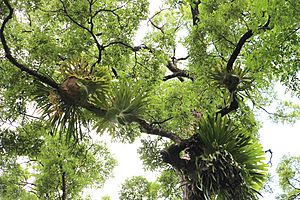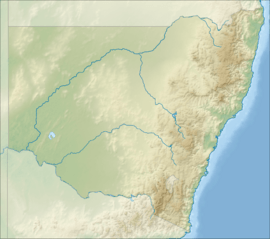Ngambaa Nature Reserve facts for kids
Quick facts for kids Ngambaa Nature ReserveNew South Wales |
|
|---|---|
|
IUCN Category II (National Park)
|
|

red cedar & epiphytes
|
|
| Nearest town or city | Macksville |
| Established | January 1, 1999 |
| Area | 10,560 hectares |
| Managing authorities | NSW National Parks and Wildlife Service |
| Website | Ngambaa Nature Reserve |
| See also | Protected areas of New South Wales |
Ngambaa Nature Reserve is a special protected area in New South Wales, Australia. It covers a large space of 10,560 hectares. This reserve is found in the Mid North Coast region. The closest big town is Macksville.
The main goal of Ngambaa Nature Reserve is to protect many rare plants and animals. It has beautiful rainforests and unique trees. The land is also very important to the local Aboriginal people. It holds clues about how people used the land long ago.
Contents
About Ngambaa Nature Reserve
Ngambaa Nature Reserve was created on January 1, 1999. It is managed by the NSW National Parks and Wildlife Service. This service works hard to keep the natural environment safe. They also protect the cultural history of the area.
Protecting Nature
Nature reserves like Ngambaa are vital for our planet. They keep natural places safe from harm. This helps plants and animals to live and grow. It also protects important ecosystems, like rainforests. These areas are like natural homes for many different species.
Amazing Plants and Animals
Ngambaa Nature Reserve is home to many interesting plants. You can find lush rainforest areas here. There are also four types of ironbark trees. These trees are known for their very hard wood.
One very special plant is the small bolwarra. This plant is one of the oldest types of flowering plants on Earth. It helps scientists learn about how plants have changed over time. The reserve works to make sure these unique species can thrive.
History and Culture
The land within Ngambaa Nature Reserve has a rich history. It is very important to the local Aboriginal communities. They have lived on and cared for this land for thousands of years. The reserve contains special places that show their deep connection to the land.
There are also signs of how non-Aboriginal people used the land in the past. These historical clues help us understand the area's story. Protecting these sites helps us learn about both Aboriginal and non-Aboriginal history.


